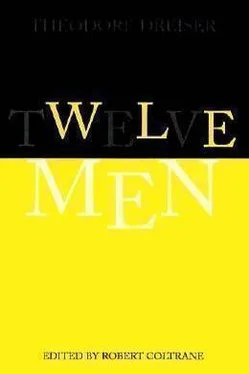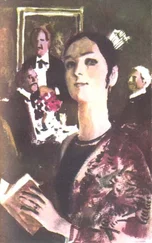Теодор Драйзер - Twelve Men
Здесь есть возможность читать онлайн «Теодор Драйзер - Twelve Men» весь текст электронной книги совершенно бесплатно (целиком полную версию без сокращений). В некоторых случаях можно слушать аудио, скачать через торрент в формате fb2 и присутствует краткое содержание. Год выпуска: 2014, Издательство: epubBooks Classics, Жанр: Биографии и Мемуары, на английском языке. Описание произведения, (предисловие) а так же отзывы посетителей доступны на портале библиотеки ЛибКат.
- Название:Twelve Men
- Автор:
- Издательство:epubBooks Classics
- Жанр:
- Год:2014
- ISBN:нет данных
- Рейтинг книги:4 / 5. Голосов: 1
-
Избранное:Добавить в избранное
- Отзывы:
-
Ваша оценка:
- 80
- 1
- 2
- 3
- 4
- 5
Twelve Men: краткое содержание, описание и аннотация
Предлагаем к чтению аннотацию, описание, краткое содержание или предисловие (зависит от того, что написал сам автор книги «Twelve Men»). Если вы не нашли необходимую информацию о книге — напишите в комментариях, мы постараемся отыскать её.
Twelve Men — читать онлайн бесплатно полную книгу (весь текст) целиком
Ниже представлен текст книги, разбитый по страницам. Система сохранения места последней прочитанной страницы, позволяет с удобством читать онлайн бесплатно книгу «Twelve Men», без необходимости каждый раз заново искать на чём Вы остановились. Поставьте закладку, и сможете в любой момент перейти на страницу, на которой закончили чтение.
Интервал:
Закладка:
Another thing was his charming attitude toward his men, kindly and sweet for all his storming, that innate sense of something intimate and fatherly. He had a way of saying kindly things in a joking manner which touched them. When he arrived in the morning, for instance, it was always in the cheeriest way that he began. "Come, now, b'ys, ye have a good day's work before ye today. Get the shovels, Jimmie. Bring the line, Matt!" and then he would go below himself, if below it was, and there would be joy and peace until some obstacle to progress interfered. I might say in passing that Matt and Jimmie, his faithful henchmen, were each between forty and fifty, if they were a day—poor, gnarled, dusty, storm–tossed Italians who had come from heaven knows where, had endured God knows what, and were now rounding out a work–a–day existence under the sheltering wing of this same Rourke, a great and protecting power to them.
This same Matt was a funny little Italian, soft of voice and gentle of manner, whom Rourke liked very much, but with whom he loved to quarrel. He would go down in any hole where the latter was working, and almost invariably shortly after you would hear the most amazing uproar issuing therefrom, shouts of: "Put it here, I say! Put it here! Down with it! Here! Here! Jasus Christ, have ye no sinse at aall?"—coupled, of course, with occasional guttural growls from Matt, who was by no means in awe of his master and who feared no personal blows. The latter had been with Rourke for so long that he was not in the least overawed by his yelling and could afford to take such liberties. Occasionally, not always, Rourke would come climbing out of the hole, his face and neck fairly scarlet with heat, raging and shouting, "I'll get shut av ye! I'll have no more thruck with ye, ye blitherin', crazy loon! What good arre ye? What work can ye do? Naathin'! Naathin'! I'll be shut av ye now, an' thin maybe I'll have a little p'ace." Then he would dance around and threaten and growl until something else would take his attention, when he would quiet down and be as peaceful as ever. Somehow, I always felt that in spite of all the difficulties involved, he enjoyed these rows—must fight, in short, to be happy. Sometimes he would go home without saying a word to Matt, a conclusion which at first I imagined portended the end of the latter, but soon I came to know better. For the next morning Matt would reappear as unconcernedly as though nothing had happened, and Rourke would appear not to notice or remember.
Once, anent all this, I said to him, "Rourke, how many times have you threatened to discharge Matt in the last three years?"
"Shewer," he replied, with his ingratiating grin, "a man don't mane aall he says aall the time."
The most humorous of all his collection of workingmen, however, was the aforementioned Jimmie, a dark, mild–eyed, soft–spoken Calabrian, who had the shrewdness of a Machiavelli and the pertness of a crow. He lived in the same neighborhood as Rourke, far out in one of those small towns on the Harlem, sheltering so many Italians, for, like a hen with a brood of chicks, Rourke kept all his Italians gathered close about him. Jimmie, curiously, was the one who was always selected to run his family errands for him, a kind of valet to Rourke, as it were—selected for some merit I could never discover, certainly not one of speed. He was nevertheless constantly running here and there like an errand boy, his worn, dusty, baggy clothes making him look like a dilapidated bandit fresh from a sewer. On the job, however, no matter what it might be, Jimmie could never be induced to do real, hard work. He was always above it, or busy with something else. But as he was an expert cement–mixer and knew just how to load and unload the tool–car, two sinecures of sorts, nothing was ever said to him. If any one dared to reprove him, myself for instance (a mere interloper to Jimmie), he would reply: "Yeh! Yeh! I know–a my biz. I been now with Misha Rook fifteen year. I know–a my biz." If you made any complaint to Rourke, he would merely grin and say, "Ha! Jimmie's the sharp one," or perhaps, "I'll get ye yet, ye fox," but more than that nothing was ever done.
One day, however, Jimmie failed to comply with an extraordinary order of Rourke's, which, while it resulted in no real damage, produced a most laughable and yet characteristic scene. A strict rule of the company was that no opening of any kind into which a person might possibly step or fall should be left uncovered at any station during the approach, stay, or departure of any train scheduled to stop at that station. Rourke was well aware of this rule. He had a copy of it on file in his collection of circulars. In addition, he had especially delegated Jimmie to attend to this matter, a task which just suited the Italian as it gave him ample time to idle about and pretend to be watching. This it was which made the crime all the greater.
On this particular occasion Jimmie had failed to attend to this matter. We had been working on the platform at Williamsbridge, digging a pit for a coal–bin, when a train bearing the general foreman came along. The latter got off at the station especially to examine the work that had been done so far. When the train arrived there was the hole wide open with Rourke below shouting and gesticulating about something, and totally unconscious, of course, that his order had been neglected. The general foreman, who was, by the way, I believe, an admirer of Rourke, came forward, looked down, and said quietly: "This won't do, Rourke. You'll have to keep the work covered when a train is approaching. I've told you that before, you know."
Rourke looked up, so astonished and ashamed that he should have been put in such a position before his superior that he hardly knew what to say. I doubt if any one ever had a greater capacity for respecting his superiors, anyhow. Instead of trying to answer, he merely choked and began to shout for Jimmie, who came running, crying, as he always did, "What's da mat'? What's da mat'?"
"What's da mat'? What's da mat'?" mocked Rourke, fairly seething with a marvelous Irish fury. "What the devil do ye suppose is the mat'? What do ye mane be waalkin' away an' l'avin' the hole uncovered? Didn't I tell ye niver to l'ave a hole when a train's comin'? Didn't I tell ye to attind to that an' naathin' else? An' now what have ye been doin'? Be all the powers, what d'ye mane be l'avin' it? What else arre ye good fer? What d'ye mane be lettin' a thing like that happen, an' Mr. Wilson comin' along here, an' the hole open?"
He was as red as a beet, purple almost, perspiring, apoplectic. During all this tirade Mr. Wilson, a sad, dark, anæmic–looking person, troubled with acute indigestion, I fancy, stood by with an amused, kindly, and yet mock severe expression on his face. I am sure he did not wish to be severe.
Jimmie, dumbfounded, scarcely knew what to say. In the face of Rourke's rage and the foreman's presence, he did his best to remedy his error by covering the hole, at the same time stuttering something about going for a trowel.
"A trowel!" cried Rourke, glaring at him. "A trowel, ye h'athen ginny! What'd ye be doin' lookin' fer a trowel, an' a train comin' that close on ye it could 'a' knocked ye off the thrack? An' the hole open, an' Mr. Wilson right here! Is that what I told ye? Is that what I pay ye fer? Be all the saints! A trowel, is it? I'll trowel ye! I'll break yer h'athen Eyetalian skull, I will. Get thim boards on, an' don't let me ketch ye l'avin' such a place as that open again. I'll get shut av ye, ye blitherin' lunatic."
When it was all over and the train bearing the general foreman had gone, Rourke quieted down, but not without many fulgurous flashes that kept the poor Italian on tenterhooks.
About an hour later, however, another train arrived, and, by reason of some intervening necessity and the idle, wandering mood of the Italian, the hole was open again. Jimmie was away behind the depot somewhere, smoking perhaps, and Rourke was, as usual, down in the hole. This time misfortune trebled itself, however, by bringing, not the general foreman, but the supervisor himself, a grave, quiet man, of whom Rourke stood in the greatest awe. He was so solid, so profound, so severe. I don't believe I ever saw him smile. He walked up to the hole, and looking reproachfully down, said: "Is this the way you leave your excavations, Rourke, when a train is coming? Don't you know better than to do a thing like that?"
Читать дальшеИнтервал:
Закладка:
Похожие книги на «Twelve Men»
Представляем Вашему вниманию похожие книги на «Twelve Men» списком для выбора. Мы отобрали схожую по названию и смыслу литературу в надежде предоставить читателям больше вариантов отыскать новые, интересные, ещё непрочитанные произведения.
Обсуждение, отзывы о книге «Twelve Men» и просто собственные мнения читателей. Оставьте ваши комментарии, напишите, что Вы думаете о произведении, его смысле или главных героях. Укажите что конкретно понравилось, а что нет, и почему Вы так считаете.









